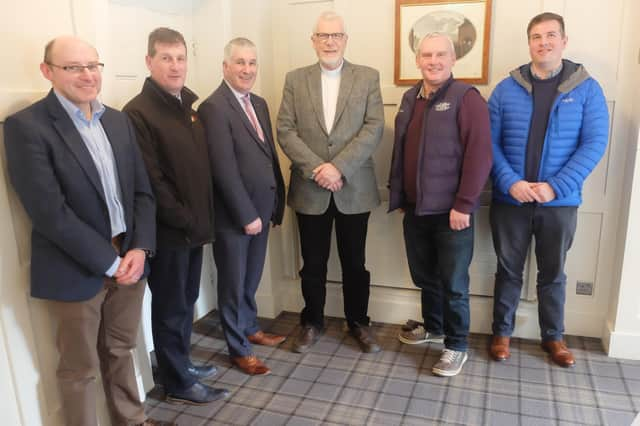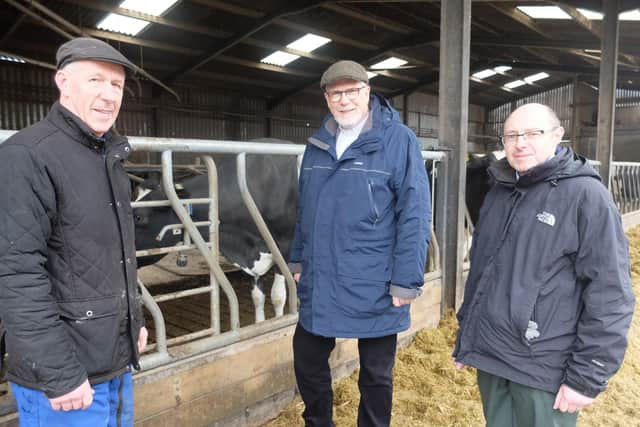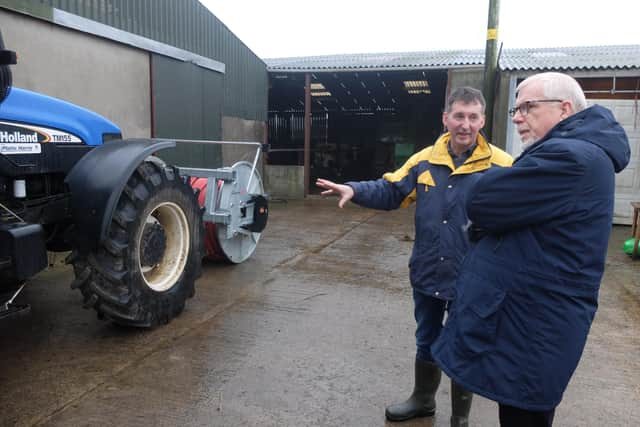The Moderator and farming matters


Dr Bruce was speaking during his tour of PCI’s Presbytery of Iveagh, which involved visits to farms and a lunch with senior farming representatives and the denomination’s Rural Chaplain.
The meetings and visits were part of 20 separate engagements in his weeklong tour of one of PCI’s 19 regional presbyteries. The Presbytery itself covers an area from the popular seaside town of Newcastle in the east, then runs north-westwards through the Mourne foothills and the Bann Valley, taking in the towns of Rathfriland and Banbridge. It then stretches as far as Gilford, Donacloney and Tandragee on its western border.
Advertisement
Advertisement
During a working lunch in Banbridge with Ulster Farmers’ Union (UFU) President, Victor Chestnutt, UFU Chief Executive, Wesley Aston, John McCallister, who represented the President of the Young Farmers’ Clubs of Ulster, and Rev Kenny Hanna, PCI’s Rural Chaplain, Dr Bruce heard and discussed the concerns of farmers and farm families.


“As a church, we seek to be active in meeting with a range of public representatives and sectoral groups to listen, discuss their concerns, hear and understand the issues that they face. Presbytery tours are primarily pastoral visits to the local church, to encourage and see first-hand the work that they are doing in the name of our Lord Jesus Christ, but also opportunities to meet with others who serve in different capacities,” Dr Bruce said.
“We had a wide-ranging and very informative discussion on many issues that continue to impact farmers and rural communities. These included, Covid, the potential impact of the climate change legislation going through the Northern Ireland Assembly, the outworking of Brexit, the related ongoing negotiations around the Northern Ireland Protocol and the opportunity to develop a new agriculture support policy,” he said.
“We also heard of the sustained and heart-breaking impact of Bovine TB on local farms and possible mitigations, along with the probable global impact on the supply of cereals and what this and increased energy and fertiliser prices will mean for local farmers as a direct result of Russia’s invasion of Ukraine. Discussions also focused on the impressive work being done around sustainability, and how local farmers ‘were on the page’ when it came to farming with nature and leading in carbon sequestration.”
Advertisement
Advertisement
Dr Bruce continued: “Farming is not easy at the best of times, yet what was abundantly clear to me was the resilience, persistence and resolve of those who work the land in all of our interests. As they seek to produce our food, and manage the countryside that we know and love, in increasingly difficult times, I wanted to make it clear that the wider church cares and is committed to those who are tasked with stewarding God’s provision. They are all deserving of our prayers – and not just at harvest time.”


Accompanied by PCI Rural Chaplain, Rev Kenny Hanna, and Rev Mark McMaw, minister of Tandragee Presbyterian Church, Dr Bruce then went on to spend a rather wet afternoon visiting two dairy farms around the County Armagh town and talking with the farmers.
Speaking about the day and his role as Rural Chaplain, Mr Hanna said: “Farming is in my blood and while I’ve been away from our farm for 27 years, I have enjoyed being a part-time farmer when I have had the opportunity. As the Moderator said, farming is not easy, it is a 24/7, 365 day a year occupation that comes with all kinds of trials and tribulations. At the same time there is also joy and contentment in a very personal vocation and connection with the land, a connection that often goes back generations.
“As Christian folk we care about farmers and farming families, just as Jesus cares, for He has come as the Good Shepherd to give His life on the cross so we can be forgiven. This is why these meetings have been worthwhile and much appreciated. We are also a very rural Church and we are here to stand with farmers pastorally, whatever their church background, or none, working with them and their representatives in partnership as part of our mission.”